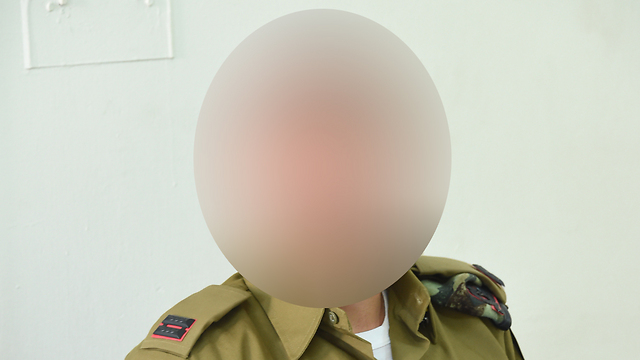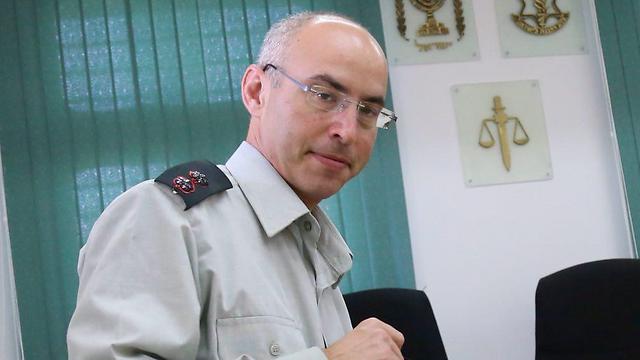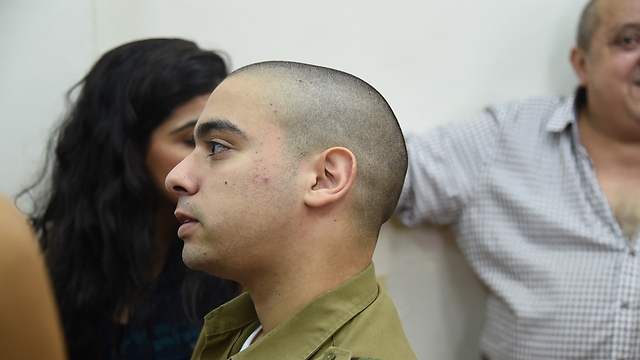The platoon commander from the Hebron soldier’s infantry company testified Monday morning, becoming the first IDF official to give testimony on behalf of the defense. He was later cross-examined by the prosecution.
The trial of IDF Sergeant Elor Azaria – who is on trial for manslaughter following a March incident in which he shot and killed an already-neutralized terrorist in Hebron – continued on Monday, with the first IDF official to testify on behalf of the defense taking the witness stand. Later on, he was cross-examined by the prosecution. Earlier in the day, Lieutenant M. claimed that the neutralized-but-still-alive terrorist was considered dangerous, and that’s why he appointed a soldier to guard him, but when answering prosecutor Lieutenant Colonel Nadav Wiesman’s questions, admitted to not mentioning this to the IDF Military Police’s Criminal Investigation Division (CID).
Prosecutor Weisman: “The things you brought up today, like the fact that you told the company commander about the fear of a bomb – you didn’t (mention) in your CID testimony.”
Lt. M: “Right. There’s no instance of that in my questioning. I also didn’t say (anything) about the briefing I gave the soldier who guarded the terrorist about the concerns of a bomb.”
The prosecutor attempted to find out why Lt. M. claimed that he feared a bomb may be strapped to the terrorist but still approached them, and even touched them.

Prosecutor Weisman: “Why did you turn over the terrorists with (your) foot? Does this mean that, until you received a warning from a civilian you weren’t worried about a bomb?”
Lt. M: “That’s not accurate… the concerns began to materialize and became several times larger.”
Prosecutor Weisman: “You’re endangering all of your soldiers if you assume there’s a bomb in the area.”
Lt. M: “You can claim I operated unprofessionally, not well enough. All of the soldiers knew, all of the forces were briefed about this.”
Prosecutor Weisman: “Why (didn’t you) move people away from the area and warn them (about) a bomb?”
Lt. M: “You can’t control this. It’s all a mess. All sloppy. You don’t know who belongs (there) and who doesn’t. It’s not so simple to say ‘you go there, and you can come in.’ I apparently failed in my duties because there was no observation over who went into the area and who did not.”
Prosecutor Weisman: “Why (didn’t) you send away the civilian who’s standing next to the terrorist and photographing him? Why (didn’t) you tell him that you think there’s an explosive device on him and it’s dangerous?”
Lt. M: “Its hard to distinguish who’s (a security or medical worker), and I – because (of the weapon he was carrying) – also recognized he was from (the local civilian population’s security) contingency squad.
Prosecutor Weisman: “So he should be blown up by the bomb? Why didn’t you send him away?
Lt. M: “There’s no answer for why. I just didn’t. Mistakes are always made, and that’s part of the mistakes. I’m not here to say I handled it in the best way.”
Prosecutor Weisman: “There’s a quote here by the company commander, (who said) he was not informed of the risk of bombs.”
Lt. M: “I told him (about) this. If he claims I didn’t tell him, it’s a lie.”
Prosecutor Weisman: “A. (another witness from the area of the incident) said you didn’t tell him anything about the bomb. What is your response?”
Lt. M: “I recall telling him.”
Prosecutor Weisman: “So is A. lying as well?”
Lt. M: “That’s what I remember.”
Prosecutor Weisman: “In the moment of the shooting, (you were) pretty close to the attacker. Don’t you think that’ contradicts your claim that he had a bomb on him? You, of all people, are standing next to him?”

Lt. M: “I didn’t go for the terrorist, I went to update the company commander.”
Prosecutor Weisman: “Why (did) you allow yourself and the company commander to stand close (to the attacker)?”
Lt. M: “In real time you don’t see things that way.”
Prosecutor Weisman: “In real time you didn’t think, at that point, about mortal danger. Because then you would have distanced the company commander and yourself (from the terrorist).”
Lt. M: “Correct. The fact that I wasn’t thinking about mortal danger at that moment doesn’t mean it didn’t exist.”
At a certain point, the judge also asked to clarify the issue of Lt. M. updating the company commander about the danger of the terrorist having an explosive device on his person, saying, “We (can) see the company commander speak and give instructions and we don’t see you telling him anything. Why?”
Lt. M: “Correct. I remember me speaking with the company commander, explaining to him, and giving him all of the details. I don’t remember at which stage.”

Judge: “The company commander told us that he received the information about the scene from the other platoon commander in the scene.”
Lt. M: “I can’t chronologically point out the moment. I am certain I told the company commander.”
In his previous testimony, on behalf of the defense, Lt. M. stated that he had told the soldier guarding the terrorist that he was allowed to open fire if the terrorist made any sudden moves or inserted his hands into his clothes. He stated that the neutralized-but-living terrorist still posed a danger, and so he placed a soldier to guard him.
As reported by Ynetnews
